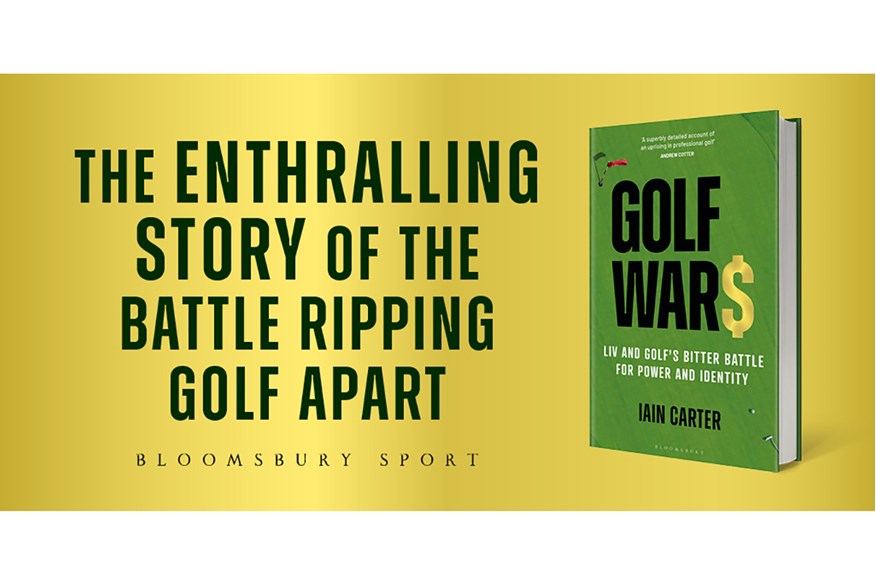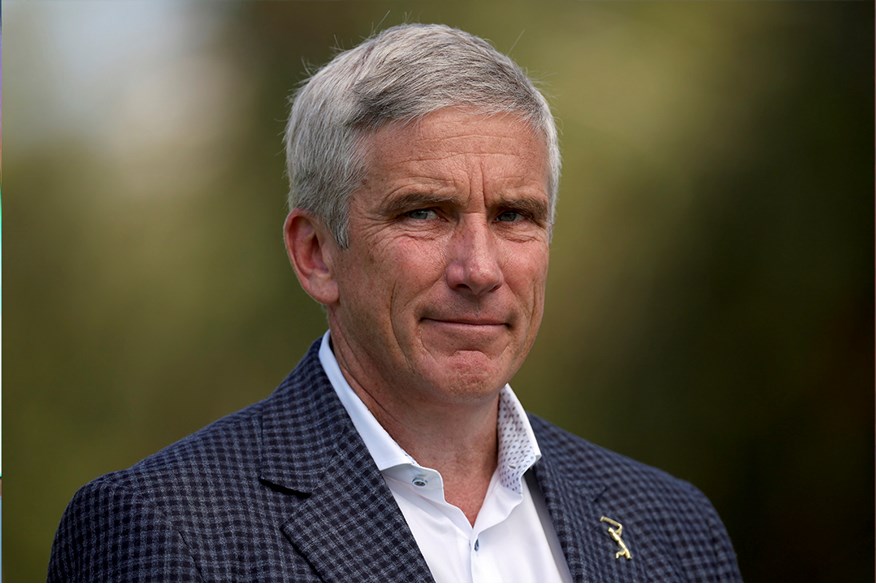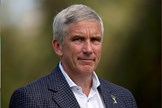Q&A: Iain Carter on authoring Golf Wars, the definitive story of LIV, greed and a sacrificial lamb
Last updated:
In an exclusive interview about his new book, Golf Wars, author Iain Carter tells us why he fears for the future of the DP World Tour and the one thing that is keeping Jay Monahan in a job…
The life of a journalist can often feel like being on a hamster wheel, trying to get to the bottom of a different story every week. It’s a feeling BBC Golf correspondent Iain Carter knows only too well. He has just spent 18 months piecing together a new book which has demanded more rewrites than he cares to remember.
Up until the day of his deadline, he was still adding new words to a story that qualifies as a must-read for anyone who wants a history lesson about the ongoing power struggle between golf’s establishment and a Saudi-backed upstart.
The fallout on the course and in the boardroom is brilliantly chronicled in Golf Wars: LIV and Golf’s Bitter Battle for Power and Identity, which details how relationships and reputations have been ripped apart over the last two years because of greed, mismanagement, and a 30-year-old feud.
In a wide-ranging interview ahead of its release on April 11, Carter spoke at length about Tiger’s growing influence, Jay Monahan’s ulterior motive for doing a deal with the PIF, and why the DP World Tour might regret its strategic alliance with the PGA Tour.
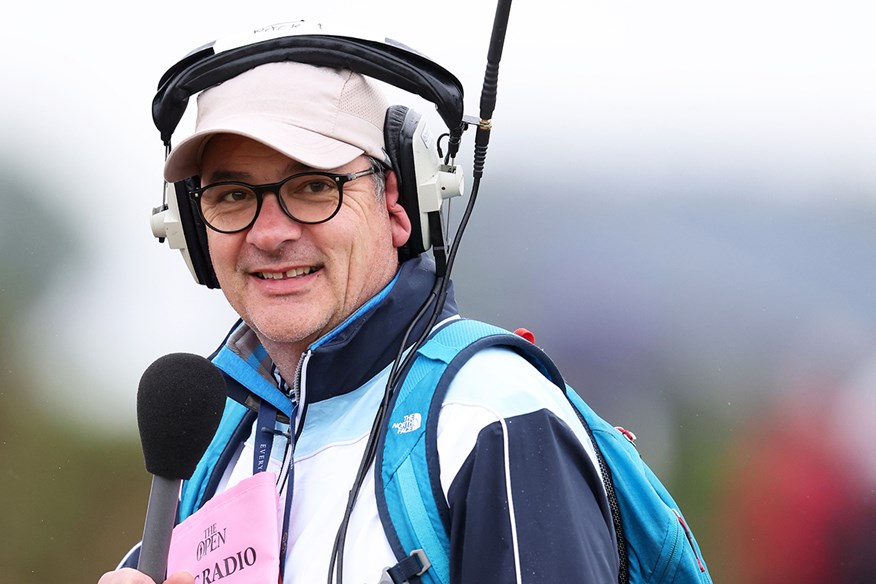
In the past you’ve written books on the Ryder Cup, the Majors and Colin Montgomerie. Was Golf Wars the most challenging because of how fast moving the story was?
It was definitely the most challenging. Normally if you start writing a book, you know the end and where you are going to get to, but I had absolutely no idea. It was like a living organism and it was changing all the time.
It was a case of charting what the start position was, which took me all the way back to Andy Gardiner. He would be idly watching golf on the TV, sketching out ideas for a golf super league… ideas which have basically been used by LIV.
Seeing what it’s done to the sport, how tour golf has been ripped apart, the schisms that have occurred between players, it just seemed really obvious to me to kick off the prologue with Rory against Reed and everything that happened at the Dubai Desert Classic last year.
The tournament was completely colored by the politics that were going on in the sport and it was a real barometer to that. At that stage you could never have envisaged Rory lobbying for a LIV player to play in future Ryder Cups. There have been character developments aplenty and so many different facets to the whole story.
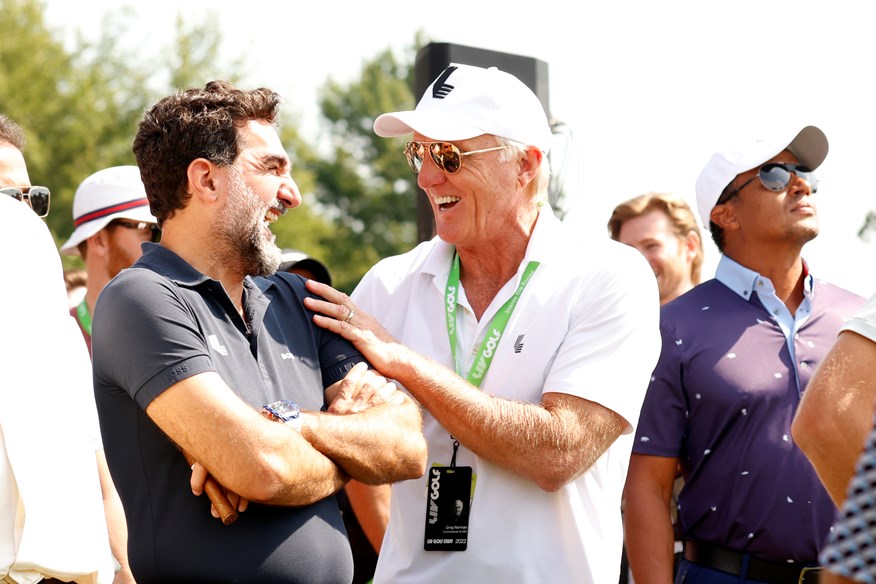
A big part of the book is focused on Greg Norman. Would all this have been possible without him because he seemed like the perfect man to take the fight to the PGA Tour given their history?
It became clear to me that what Saudi Arabia wanted to do was really upset the establishment and shake things up. And who better to do that than Greg Norman? He brought golfing gravitas; he brought business acumen.
He ticked all the boxes and the biggest box from the Saudis’ point of view was that he could really stir things up. He would say things that were stupid enough to make headlines. And I don’t mean that in a nasty way. He was out there and would say stuff and make headlines and that’s what they needed.
He was also fuelled by a chip on his shoulder because he was outmaneuvered by Tim Fincham in bringing out his world tour. That sense of vengeance against the PGA Tour has really poured flames on the disconnect that was in the game.
What are some of the biggest revelations you uncovered?
I don’t think it’s a revelatory book as such. It’s more a digest of where we got to and how we got to each different stage. But the biggest revelations for me were contained in the Senate papers and how willing the PGA Tour were to suddenly pivot from their anti-Saudi Arabia position. It happened so quickly and was very self-serving.
Getting rid of Greg Norman, putting Ed Herlihy and Jimmy Dunne in charge, it was all just being carved up. It was fascinating to see how it all came together, it was back of a fag packet kind of stuff, which is just mind-blowing when you consider what’s been at stake.
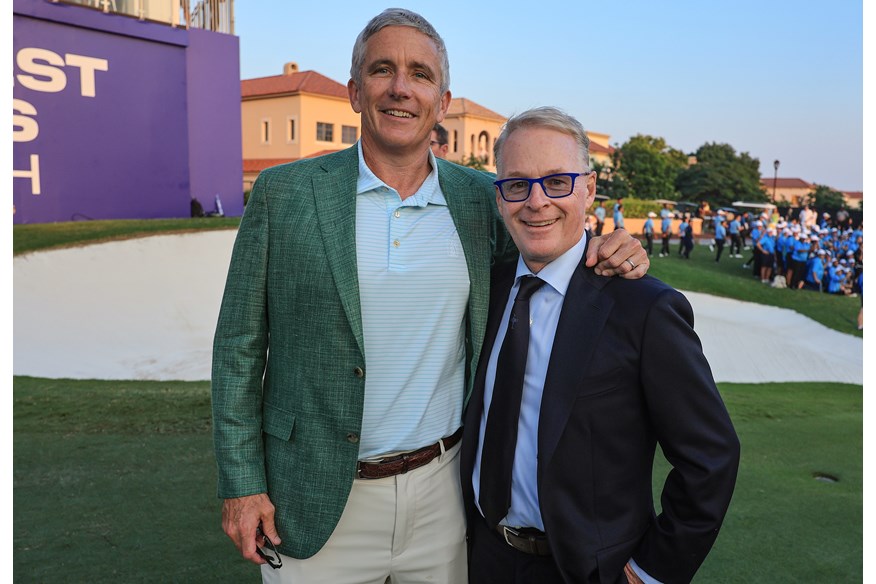
Is Jay Monahan on borrowed time or in a position of strength?
He is not in a position of strength at the moment. The players are holding the whip. He’s had to cede that power to them because of the way he blindsided them with the framework agreement. But what gets forgotten in all this is that the members are now significantly better off financially than they were previously.
Every single player is guaranteed half a million dollars regardless of how they play. They’re playing in these signature events and competing for fantastic prize funds across the board. Yes, there are plenty of players dissatisfied with the direction he’s taking, but there are an awful lot who are better off because of what he’s done.
And that could keep him in a job.
Ultimately, he is the CEO of a member organization. His shareholders are his players, and they are the people he has to keep happy. But he’s not just the CEO of PGA Tour Inc. He is CEO of PGA Tour Enterprises. He’s on the board of the DP World Tour. He is a massively influential man, but he’s also massively influenced by the people around him.
A running theme throughout the book is the Ryder Cup and the PGA Tour wanting to get their hands on it. Can you see that happening?
Yes, I can, because they’re going to have the financial might. It’s been suggested that the ultimate game play is that the PGA Tour buys the PGA of America and therefore gets the US side of the Ryder Cup. They also sit on the board of the DP World Tour, which is basically part of the European Tour Group. So then it would have the Ryder Cup. And if the PIF invest in the PGA Tour, then Saudi Arabia get their hands on the Ryder Cup as well.
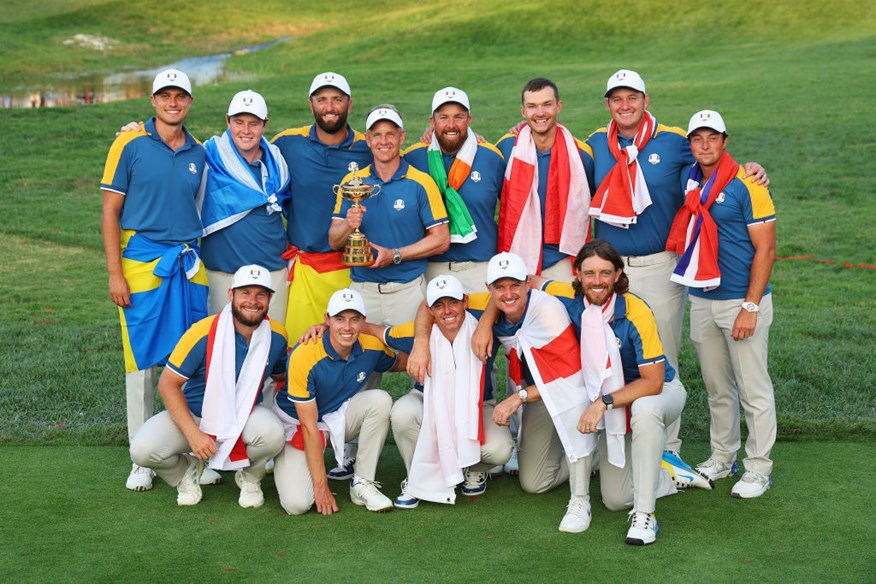
People might be surprised to see a chapter dedicated to Donald Trump. Is he more important to the story than people realize?
A little bit. I just thought it was fascinating that he came down on the side of LIV. But it’s called Golf Wars because there are all sorts of little splinter battles going on left, right and centre. Think of the distance debate for example. Another one is Donald Trump trying to get The Open back to Turnberry and being at loggerheads with the R&A.
When you think of the properties that he has, he should be a massive player in golf. But he’s kind of been ostracised because of his politics. In that sense, he’s a perfect bedfellow for LIV. The US PGA didn’t want to go to Bedminster so they took a LIV golf event there. The PGA Tour didn’t want Doral anymore, so LIV had their end-of-season championship there. His kind of brash, gauche outlook on life is very LIV. I thought it was a good reflection of our times and it was interesting to observe him up close.
Having completed this project, are there any unanswered questions that gnaw away at you?
Lots. The biggest one is: where does this all lead? Also, what I find really hard to quantify is how significant the DP World Tour is in all this. If you look at the PGA Tour policy board and the board of PGA Tour Inc, there is not one European person. The Player Advisory Council (PAC) has one European, Seamus Power, but he doesn’t really play on the DP World Tour.
I put this point to Jay Monahan and he said, “Yes, but I am on the board of the DP World Tour and we have two places on the DP World Tour Productions board.” But that’s skewed the other way. So how much say is (DP World Tour Chief Executive) Guy Kinnings going to have and how much could the DP World Tour influence any relationship with Saudi Arabia? There was a relationship in the past, but that disappeared with LIV and the alliance with the PGA Tour.
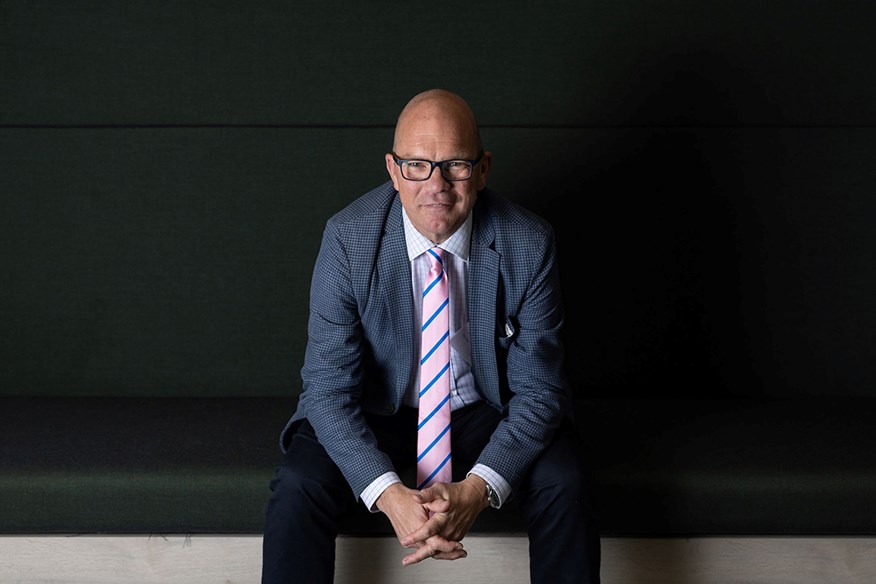
Do you fear for their future?
I fear long-term where the DP World Tour is going to be positioned on the golf calendar. Keith Pelley has done a great job with his relationship with the PGA Tour in securing the future of the tour, securing prize fund inflation and guaranteed purses for a decade, but where is there the scope for the DP World Tour to grow while tied to the PGA Tour?
Did they make a mistake by not pursuing the Premier Golf League (PGL) concept?
They looked at it very closely. There was a five-month period where Keith Pelley had no contact with Jay Monahan because he was analyzing whether the future should be in tandem with the PGL or the PGA Tour. He had two executives – Guy Kinnings was one of them – and they were running the numbers.
Ultimately, the PGA Tour ran out the winners in that analysis and I think the PGA Tour recognized the danger of the DP World Tour going in the opposite direction and becoming a genuine rival to them. t was a defensive move by the DP World Tour, but it gave them the security they needed at that time.
Where they might have regrets is in the breakdown of the relationship with Saudi Arabia. Once the PGA Tour deal was done, there was a confidential condition within it which said they couldn’t
jump into bed with another circuit. It meant that when they had the infamous Malta meeting, all they could offer was a kind of sponsorship deal, not an out-and-out partnership going forward. That’s why that deal could never happen.
Now, they feel that they did absolutely everything correctly, but if you were to talk to Ian Poulter or Lee Westwood, those guys who went to LIV are convinced that a massive, lucrative opportunity was missed.
Has your opinion about LIV and the PGA Tour changed since writing the book?
Yes, I think so. I always felt there was a need to modernize the game, but I was skeptical about the
source of funding with the Saudi Arabian influence and the concerns over human rights. But when you look at other countries and see human rights abuses and their relationships between sporting bodies, why should we just concentrate on Saudi Arabia?
The fact that the PGA Tour used human rights and the 9/11 families as an excuse for players not to go, then jumped into bed with the Saudis was utter hypocrisy. I think the fundamental change is the reinforcing of the notion that greed drives all this. That’s the saddest part of it all.
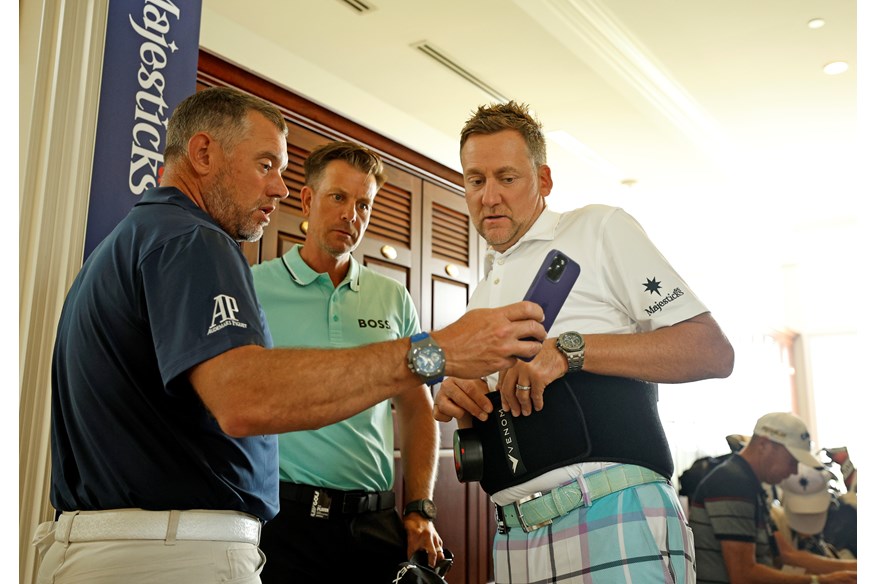
Has your opinion of certain players changed?
I see golfers more through cynical eyes now. When the initial breakaway happened, I was intrigued to see how players could forgo glory for greed. The thought that Poulter, Westwood, McDowell, Garcia and Stenson could take the money – from a position of being comparatively wealthy – made me question how much I should be a fan of these people.
I get why a Laurie Canter went, because he is securing himself financially, but the guys who are already financially secure and wanted more money I instinctively railed against. The longer this has gone on, the more I can see why they did it; because it’s just an industry and just a job.
Does the PGA Tour need the PIF more than the PIF need the PGA Tour?
(Pauses) I think the prime reason the PGA Tour needs the Saudi PIF is to stop the bleeding of talent. Jon Rahm proved that everybody has a price, because he was a legacy guy. If Rahm can go, anybody can go. That’s why they need this coming together, otherwise the PGA Tour wouldn’t be able to continue and its biggest challenge is to maintain and grow its audiences. What we’re seeing in this fractured landscape
is pretty tiny audiences for LIV and decreasing audiences for rank-and-file PGA Tour events, including the Players.
Who is winning the power struggle so far?
The fact PIF want to talk to the PGA Tour and the PGA Tour are happy to engage shows neither side is winning. They both see a better world. In the short term, it feels like LIV have been winning the battle because of the damage they’ve inflicted, but the PGA Tour still has what LIV can never buy: history, legacy and tradition. LIV is miles away from having any of that.
I’ve heard it said that Yasir (Al-Rumayyan) could drop LIV and move on. If it happened, people would be surprised, but they’d say, “That’s what you get with Saudi Arabia.” LIV has been a vehicle to get where they want to be, which is sitting next to Tiger Woods in a meeting.
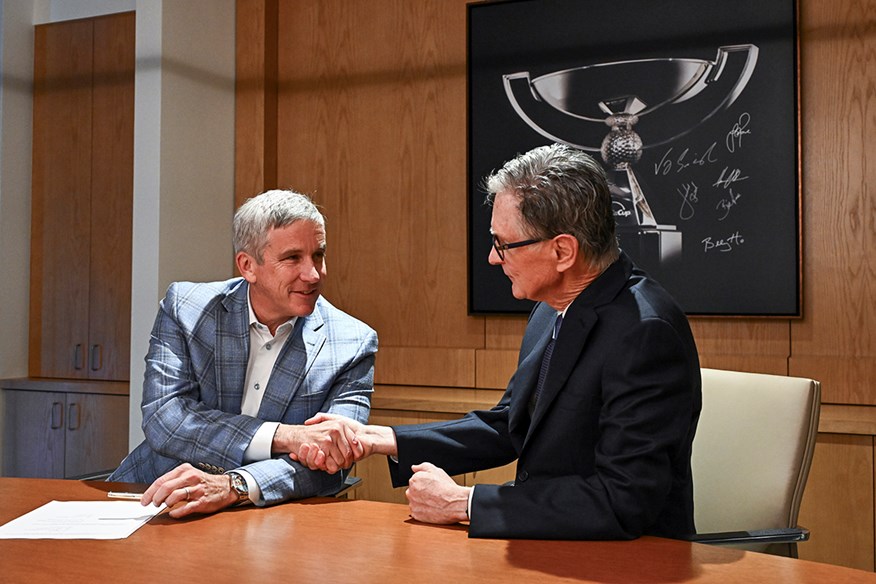
Why are we still waiting for a resolution?
The biggest stumbling block to a deal now is the power of the players and the number of players that are on the policy board. You’ve also got to ask how influential Tiger Woods is in all of this? Suddenly he joins the board and there’s a pivot away from doing the Saudi deal and SSG (the US-based Strategic Sports Group) emerges into the mix.
As it stands, I think Fenway Sports Group, SSG, are going to be key going forward in shaping what sort of PGA Tour we are going to have. The players currently hold a lot of sway because they’ve got to be persuaded, but ultimately that is the job of the executives.
If you were writing a sequel in 10 years’ time, how do you think the men’s professional game will look?
This is what I hope is achievable. A coordinated global calendar, Formula 1 style, with offshoots such as short-form golf, which could easily come under LIV Golf or TGL. Some would be indoor simulators, others on indoor courses, and all in the fall season.
You could then have a swing which would take you from the southern hemisphere to the Middle East, to the West Coast of America, to Florida and then into Majors season, followed by a European season and an American playoff season. Then there could be tour events that feed into that and create this 70-man traveling circus. That feels like utopia but it also feels achievable – if the Americans find their passports.
TG readers can enjoy 25 percent off Golf Wars when you order on Bloomsbury.com. Enter code ‘GOLFWARSTG25’ at checkout to redeem this offer. RRP £20.
